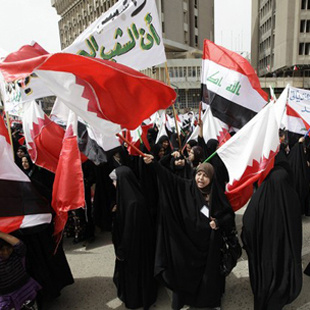Interaction is the Best way to Deal with People
310.jpg)
 IRD: In his speech on Thursday, Barack Obama stated that the public arrests and brutality imposed by the Bahraini government on its people are against the global rights of Bahraini citizens. The US president emphasized that the only solution to resolve issues between the Bahraini government and the opposition is negotiation, but as long as peaceful protesters are in prison, negotiation will be impossible. In regards to Obama’s speech and the possibility of reform by Al- Khalifa in Bahrain, we talked to Hasan Sobhani, Vice President of the National Security and Foreign Policy Commission of the Parliament.
IRD: In his speech on Thursday, Barack Obama stated that the public arrests and brutality imposed by the Bahraini government on its people are against the global rights of Bahraini citizens. The US president emphasized that the only solution to resolve issues between the Bahraini government and the opposition is negotiation, but as long as peaceful protesters are in prison, negotiation will be impossible. In regards to Obama’s speech and the possibility of reform by Al- Khalifa in Bahrain, we talked to Hasan Sobhani, Vice President of the National Security and Foreign Policy Commission of the Parliament.
IRD: Obama’s recent speech shows signs of change in his policies towards the developments in the Middle East. How can this change of position be interpreted, and how can it influence the issues in Bahrain?
HS: What we are witnessing in some Middle Eastern countries, especially Bahrain, is not justifiable by any logic. The discriminations in the administrative system of Bahrain and its ignorance of the minimum rights of citizens-- in addition to other problems-- all indicate that the conduct of the Bahraini government is not defensible.
If in the past, the US and the West supported Bahrain, and it was because they were afraid that any changes could impact regional equations and possibly harm their interests in the region.
The continuation of this support will definitely harm the West and result in further instability for its bases in the region. There’s no doubt that future governance is by nations and the people, and it will be the people who will determine their future. Therefore, countries in the region and their despotic rulers should realize the fact that 19th century tendencies-- where people would obey whatever the king said-- are not acceptable anymore and they have to act upon the will of their people.
Therefore, the West has applied changes in its policy toward the region. Of course this change is not because of their sympathy toward the people; on the contrary, it is to secure their long-term interests in Arab countries.
When the West advises the Bahraini king to adopt reforms in his policies, it is because they want to implement a controlled democracy in this country. However, the demands of the people do not end here, but this is what Arab countries have agreed upon.
IRD: Is the West going to pressure Saudi Arabia to withdraw its forces form Bahrain?
HS: Of course if they really want to adopt reforms, they have to do this. In other words, while there’s a curfew in Manama, reform does not make any sense. Reform means paying attention to the will of the people and the people demand to be freed from the occupation of Saud Arabia.
Naturally the withdrawal of Saudi troops will be among the important issues for both Bahrain and Saudi Arabia. Saudi Arabia is actually seeking such an opportunity, because the occupation of Bahrain has only imposed huge expenses on this country and damaged its reputation in the region. Therefore, Saudi Arabia is seeking an excuse to end its occupation and put an end to the expenses that has brought with it.
IRD: Do you think Al-Khalifa’s regime will again oppose adopting reforms and continue its crackdown on the people?
HS: Al-Khalifa is only a tool and has little independence. The regime lives under the flag of Saudi Arabia, the US and Britain, and has no authority, position or prestige among its people. In fact, if Al-Khalifa has been able to survive until now it is due to the support it receives from the West, and the US in particular. If these supporters put Al-Khalifa under pressure, the regime will have no power to resist and will eventually give up. Also, if these demands are not met they will be imposed on the government by the people.
IRD: What is Iran’s position in regards to this issue?
HS: The Islamic Republic has asked the Bahraini government to consider the demands of its people, and remove the existing discriminations. Iran had announced its position since the beginning of the crisis without intervening in the internal affairs of Bahrain; similar to its position in Yemen, Egypt, and other countries.
Finally these actions should satisfy the people who took to the streets to protest, in other words groups and oppositions within Bahrain should be satisfied with any reforms. If this happens, we can be hopeful of change in this country. The Islamic republic has always emphasized that negotiation with people and meeting their demands is the least costly and best way for Bahrain’s rulers. The situation where a minority rules the majority through the power of bullets, imprisonments, exile and torture will not last long. Therefore it is to their own best interest to consider their people’s will.

